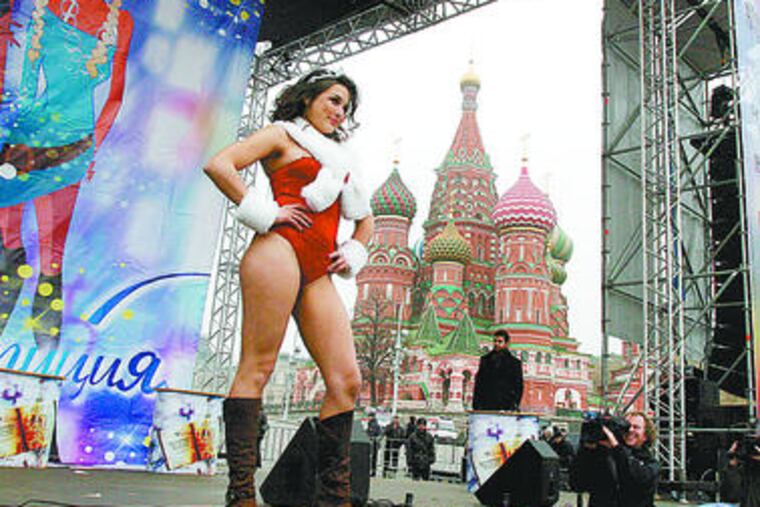Wrapped in the Russian flag - and little else
MOSCOW - Miss Constitution had yellow curls that bounced down her back, wide blue eyes, and a sweet if faltering singing voice.

MOSCOW - Miss Constitution had yellow curls that bounced down her back, wide blue eyes, and a sweet if faltering singing voice.
She shimmied barefoot, donned a swimsuit in freezing temperatures, and spoke plausibly about the responsibilities of the Russian state.
When her moment of glory came, Masha Fyodorova was draped in the Russian flag and handed the keys to a new, pink-and-orange Mini Cooper. She strolled off the stage in a shower of confetti and sparklers, an economics student from the provinces reborn as an official paragon of patriotic womanhood.
The recent gathering of B-list pop stars and hundreds of diehard pro-Kremlin youth activists on the edge of Red Square was beauty pageant as patriotic ceremony, emblematic of today's sexed-up, nationalistic Russia.
In between trilling traditional songs extolling the Moscow scenery and strutting in their bathing suits, Fyodorova and three other nubile finalists paused to answer questions about authority, state obligations and the role of the elite.
"Who is the only source of authority in the Russian Federation?" the announcer asked.
"The multiethnic people of the Russian Federation!" one of the women fired back.
Organized by the government and pro-Kremlin youth group Nashi, or "Ours," the pageant was aimed at whipping up public enthusiasm for the constitution.
The 15th anniversary of the post-Soviet constitution has fallen at a sensitive moment as President Dmitry Medvedev, backed by Prime Minister Vladimir V. Putin, is pushing the first-ever amendments.
Among other changes, the amendments will lengthen the presidential term from four to six years. Putin, first as president and now as prime minister, has steadily centralized power and cracked down on freedoms.
Many analysts believe the amendments, now just a formality from being passed, are designed to give Putin and his allies an even stronger hold on power.
They predict that Putin, who was forced from office by term limits earlier this year, is laying the groundwork for a prolonged return to the presidency.
If so, no one here was complaining. Putin is wildly popular among Russia's youth, who credit the former KGB agent with restoring their country to its rightful wealth and power.
"These days all the youth are rallying around the authorities," said Isabela Berberian, a 20-year-old chemistry student and Nashi member who rode an all-night bus to attend the beauty pageant.
These young people say they consider themselves "Putin's generation." They talk earnestly about preserving Russian culture, fixing up monuments to the Great Patriotic War (as World War II is known in Russia) and diminishing Western influence.
But for all of their patriotic fever, they are still college-age students, with the requisite off-color humor.
"I'm looking for the ideal Russian woman," said Alexander Titarenko, an 18-year-old management student. "I'll be voting for the most beautiful girl."
One by one, the four finalists burst forth on stage, stripped to skimpy dresses and gyrated with backup dancers. American hip-hop poured from the speakers: "Nasty girl, I want to do you all night long."
Pavel Astakhov, a high-profile lawyer and television anchor who sat as a judge, was visibly enthused.
"They're remarkable," he told the crowd suggestively. "Exactly what the constitution should be: precise, elegant and with plenty of - content."
There was a dance troupe that performed a breakdance number titled "I Love the Constitution."
Soon the women lined up like schoolgirls for a quiz, interrupting one another to shout out their answers.
The announcer queried:
"Now the whole world is in financial crisis. Can Russia use the financial crisis to strengthen its international position?"
Certainly, they replied.
"Russia can do all!" one of them crowed. "The ruble is strengthening," she continued. "Our love for life is getting stronger."
The announcer chuckled. Everybody in Russia has been watching worriedly as the ruble slumps, along with employment and public confidence.
"We have four optimists on the stage who believe the ruble is getting stronger!" he chimed in with a note of approval in his voice.